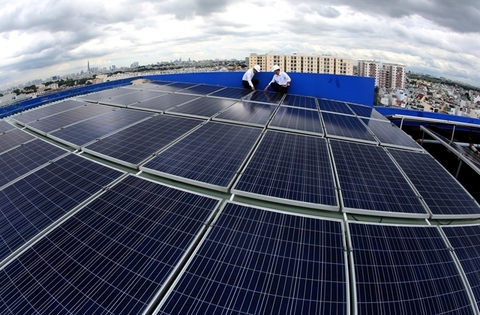
Rooftop solar panels are installed on a building in HCM city's Go Vap District. — VNA/VNS Photo Ngoc Ha
Low power demand coupled with an oversupply of electricity at times have forced authorities to cut the capacity of renewable energy plants to avoid overwhelming the national grid, according to the Ministry of Industry and Trade (MoIT).
Significant investments from social resources have been poured into developing renewable energy, particularly solar energy, in recent years, according to the ministry.
However, a boom in high-capacity renewable energy projects, mainly in central and southern Viet Nam, has overloaded inter-regional transmission lines and caused oversupply at times, the ministry said in Document No 1226/BCT-DTDL sent to the National Assembly’s committees for Science, Technology and Environment, and Economic Affairs and the Office of the Government explaining its stance on the power capacity cut.
Additionally, domestic demand for power has fallen below normal levels due to the impact of COVID-19, which led to an oversupply of electricity during off-peak times such as holidays, weekends, and at noon, the ministry said.
According to the ministry, this is a very dangerous situation that adversely affects the safe operation of the national grid.
Though the National Load Dispatch Centre (A0) has reduced the output of traditional energy to the minimum, the oversupply remains, so the centre had to make another cut to renewable energy capacity to prevent the electricity system from collapsing.
The ministry has ordered Vietnam Electricity (EVN) and A0 to calculate the required reduction of capacity at all renewable power plants in a transparent and fair manner, regardless of who their investors are.
The ministry added that it has received Government approval to supplement various power transmission line projects into planning while urging EVN to fast-track the progress of existing projects to raise the capacity of the national electricity network.
New solar power price
The MoIT will issue a new price mechanism for rooftop solar power this month, with prices likely to fall to below 6 US cents per kWh, according to Hoang Tien Dung, Director of the ministry’s Electricity and Renewable Energy Department.
Rooftop solar power would fetch only 5.2-5.8 US cents per kWh, depending on each project, Dung told the media.
The new rates had been calculated based on an assessment by foreign consultants on the changes to and development of renewable energy and the price of solar power equipment in Viet Nam and around the world, he said.
Dung added that an estimate of various costs like the initial investment, operations and maintenance, installation and connection were also taken into account.
The lower price was partly due to the recent sharp decline in solar power equipment prices.
"Solar panels are now far more efficient, allowing more electricity to be produced than previously," he noted, adding that this would be beneficial to investors while the Government could take advantage of the increasing supply of clean energy at affordable prices and the falling level of investment required to develop national electricity networks.
He went on to say that, for end-users, the new rates would be much lower than those of Vietnam Electricity (EVN). People and businesses would be encouraged to install rooftop solar panels for their own use, instead of selling all power generated to the national grid to enjoy high returns, he said. Viet Nam expects to produce 25,000-26,000 MW of solar power by 2030.
The reduction of 20-30 per cent in the purchase price of rooftop solar power still ensures benefits of parties such as EVN, investors and the State, according to Dung.
However, Nguyen Van Be, Chairman of the Association of HCM City Industrial Park Enterprises, said the price reduction to 5.3-5.8 US cents/kWh was a big drop. That would make investors uninterested in investing in rooftop solar power projects.
The export processing zones and industrial zones in HCM City have the advantage that the roofs of factories are very large and suitable for the development of rooftop solar power projects. With the old purchasing price at 8.38 cents/kWh, many enterprises wished to invest in those projects.
With this price, the investor could make their money back within 5-7 years, but with the new price in the draft, they would take more than 10 years.
Tran Van Nhon, Director of Intech Vietnam Green Energy Development Joint Stock Company, said to ensure that businesses have investment motivation, the State should issue incentives based on actual conditions. Those who want to invest in rooftop solar power projects for their own use could sell the rest of 60-70 per cent of power output at the old price.
Meanwhile, producers that want to produce rooftop solar power only for sale, must sell power at the lower price in the draft.
In addition, the pricing mechanism could be zoned to promote investment in solar power projects in low radiation regions to avoid investment being concentrated in certain areas. — VNS